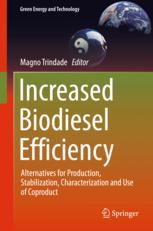

Most ebook files are in PDF format, so you can easily read them using various software such as Foxit Reader or directly on the Google Chrome browser.
Some ebook files are released by publishers in other formats such as .awz, .mobi, .epub, .fb2, etc. You may need to install specific software to read these formats on mobile/PC, such as Calibre.
Please read the tutorial at this link: https://ebookbell.com/faq
We offer FREE conversion to the popular formats you request; however, this may take some time. Therefore, right after payment, please email us, and we will try to provide the service as quickly as possible.
For some exceptional file formats or broken links (if any), please refrain from opening any disputes. Instead, email us first, and we will try to assist within a maximum of 6 hours.
EbookBell Team

4.1
70 reviewsThis book advances the use of biodiesel—more environmentally friendly than traditional fossil fuels—by showing how it can be synthesized at a lower cost, with greater efficiency and as a more pure and stable product. It presents methods based on fluorescence spectroscopy, which are less time-consuming than the traditional Rancimat analysis for monitoring stability, and are therefore less prone to allowing oxidative decay in the biofuel. Biodiesel exploits a variety of raw materials, from freshly harvested cottonseed to recycled cooking oil. These are cheap to produce and generate fuel lower in polluting sulphur and aromatic compounds than its petroleum-based equivalent.
Beginning by addressing different protocols for synthesis based on fatty acids, methyl and ethyl esters, it then describes chemical analyses essential to establishing the purity of the biodiesel. It highlights in detail the use of multifunctional and synthetic antioxidants, and investigates the impact of synthetic chalcones and their derivatives on the oxidative stability of biodiesel.
The author goes on to explain how to ameliorate various influences – UV irradiation and metal contaminants for example – which increase the hazards of oxidation, such as degradation and instability. New pre-treatment procedures performed using ultrasonic energies, thermostatic bath and vortex stirring are not only more environmentally friendly, but cut down on the time-consuming process of determining metal content, and allow for the use of more environmentally friendly aqueous reagents. The book investigates and demonstrates these techniques on the basis of real-world results.
Further, it suggests the practical uses of byproducts of biodiesel production, for example, using glycerol as a source of energy and high valuable chemicals. These useful techniques aid any researcher exploring the production process of biodiesel and its stabilization and characteristics.